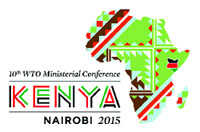
Murli Manohar Joshi
Trade Ministers from the World Trade Organisation’s 161 member countries have met in Nairobi, Kenya, to discuss issues related to trade liberalisation under the ongoing Doha Development Agenda (DDA). The US and European Union (EU) continue to attack the right of developing countries such as India.
World Trade Organisation (WTO) Director-General Roberto Azevedo hinted at the need for inclusion of new issues for negotiations at the multilateral forum to keep the relevance of the organisation alive - a setback for India that is trying to stop developed countries from introducing new items in the agenda.
“A fundamental achievement here in Nairobi would be for negotiators to go out with renewed confidence and a common view for the future. And that vision has to be about not just focusing on issues on the table but looking around, looking at the world and looking at what we have around us, and begin to discuss these things and talk about these things,” Azevedo said at a press conference on Tuesday — the first day of the WTO trade ministers’ meeting in Nairobi. US Trade Representative (USTR) Michael Froman has officially stated that it is time to bury the Doha agenda and move ahead.
“Trade ministers should draw inspiration from the climate change meet in Paris that recently delivered a pact despite huge differences in positions held by member-countries,” the DG said, delivering his speech at the opening session of the Nairobi Ministerial.
Taking on a more direct approach, Kenya’s International Trade Minister Amina Mohamed, who also holds the chair at the ministerial, said that either Nairobi should deliver a negotiating agenda for the future or the WTO should stop functioning as a negotiating body.
In this backdrop the Indian delegation must come out in support of the legitimate concerns of the developing world and should continue to resolutely defend any attempt by the developed nations of introducing new items or to divide the poor nations. Twenty years of the working of the WTO have not been in favour of the developing countries like India. Some of the economies are facing devastating impacts. The WTO’s Agreement on Agriculture (AOA) has been used by agribusiness from the North as a dumping mechanism on developing countries and has destroyed livelihoods of millions of farmers in the agriculture sector.
To add insult to injury, the US and EU have now launched a frontal challenge on countries such as India that provide price support subsidies to resource-poor farmers in the form of a minimum support price (MSP) for public stockholding through the Public Distribution System (PDS).
At Nairobi, the US and EU have steadfastly blocked all talks for a permanent solution on the food security proposal. The US has gone further, submitting a proposal that calls for commitments that prohibit budgetary allocations, price support and input subsidies for public stockholding programmes. In gist, while developed countries such as the EU and US continue and even increase their agricultural subsidies, developing countries’ programmes to ensure the livelihoods of millions of poor farmers and national food security are under attack.
At the conference in Bali, Indonesia, the Group of 33 developing countries had tabled a “Food Security Proposal” that would shift these subsidies to the Green Box and therefore be allowed without limits. However, at Bali, developing countries such as India were forced to agree to a compromise “Peace Clause” that put a moratorium on legal challenges but with stringent conditional ties and reporting procedures that made it almost unusable. Also, no new food procurement programmes can use the Peace Clause.
Further, the US and EU are leading the effort on ‘plurilateral’ negotiations (between a select few countries) for a new Information Technology Agreement (ITA) and elimination of tariffs for environmental products under the Environmental Goods Agreement (EGA). In 1996, India signed the ITA-1 and eliminated its tariffs in more than 200 IT products. This virtually decimated India’s hardware industry.
The negotiations for an EGA are being carried out under the false propaganda that reduction of tariffs for environmental goods will help in the fight against climate change. It is important to note that most of the products included are industrial products produced mostly in advanced industrialised countries. Providing market access in the developing world for these products is the key agenda here. Developing countries’ demands to include climate friendly agricultural products have been ignored.
Currently, India is not a participant at either the ITA-2 or EGA, but is under tremendous pressure to join. These plurilateral negotiations undermine the multilateral nature of the WTO and represent a divisive agenda of developed countries to gain market access in sectors they enjoy competitive advantage. Products covered under these new agreements represent new frontiers in growth, technological advancement and job creation. Therefore, developing countries need to protect their development policy space to establish indigenous industrial capabilities, create value addition and employment. Signing onto the ITA-2 and EGA will eliminate such possibilities.
The writer is a senior BJP leader.


























